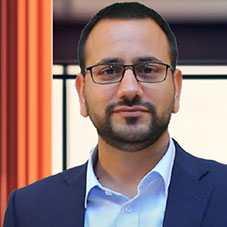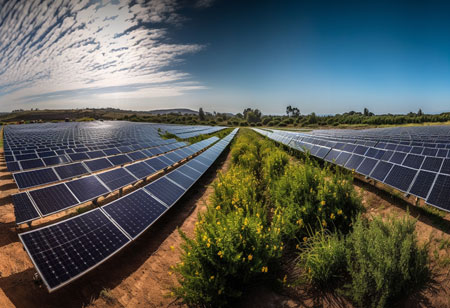
Sunil Badesra
Country Head
Given India’s sustainable development goals, India’s power generation landscape is rapidly transforming toward a more significant share of renewable energy. Solar energy based applications today benefit millions of Indians by meeting their daily cooking, lighting, and other energy needs in an environment friendly manner. Standing tall on its large-scale success in solar energy solutions, India even spearheaded the International Solar Alliance (ISA), an action oriented, member driven, collaborative platform for increased deployment of solar energy technologies. As we look forward to our bright future in the renewable energy industry, Sunil Badesra, Country Head, Sungrow India, joins us to decipher the latest challenges and opportunities in the segment.
The energy industry is on a transition curve with ambitious future targets. How do you look at these transitions as well as the goals?
India has successfully achieved the 100 gigawatts renewable energy target by 2022, which we set a few years ago. In recent years, we have witnessed some aggressive numbers, which has given consumers an advantage. The huge drop in the pricing and tariffs is an example. Going forward, India has set a target of 500 GW of capacity at the cost of ₹2.44 lakh crore by 2030 to keep its global commitments to source half its energy from non-fossil fuel sources. I believe this will pay the way for more value addition. With the prospect of more and more projects, more investors will be attracted to the Indian market, which will create a significant number of jobs soon. It will also further reduce our dependence on fossil fuels, which points toward a decrease in the import of coal and other non-renewable energy sources. It will indirectly and directly contribute to
the Indian economy. Hence, going forward, it is a sure bet that renewable energy will play a vital role in power generation and contribute to the Indian economy.
What are the kinds of challenges the industry faces, and what are the emerging technologies that help address these challenges?
Today, India is one of the fastest-growing economies in the world. It goes without saying that energy demand is going to increase every year. Hence, bridging that gap between supply and demand is a huge challenge.Renewable energy is contributing significantly to solving this challenge. However, solar power is not available around the clock. We see huge demand, especially during the morning and evening. This is where the new technologies and solutions come into play, such as battery energy storage solutions, where power can be saved in the batteries and fed to the grid during the morning and evening peak times. Similarly, we can see that many developers are aggressively promoting hydropower. There is an increasing interest in these pumped hydro storage solutions. Along with that, the adoption of green hydrogen is also slowly and gradually gaining momentum in India. Hence, the development of such technology aspects will definitely increase the grid’s efficiency. Eventually, we can manage the demand by bringing a sense of flexibility to the grid.
The industry will likely run into a substantial power demand for electrification across areas like transport and real estate in the not so-far future. How do you analyze this predicament?
As I mentioned, with the increasing need for electrification across the country, the energy demand is expected to sky rocket. We need to be well prepared in advance to face such a predicament. Considering the fact that we are betting high on being a much larger economy, we can’t afford a situation wherein we don’t meet the energy demand.
Electrification across the industry verticals is a crucial part of this economic goal. For instance, there is a lot of electrification happening in the electric vehicles (EV) segment. The government seems to have a keen focus on promoting electric mobility. When this EV push combines with a more robust charging infrastructure, EVs have great potential to contribute to the economy at large.
When it comes to the electrification of buildings, I think we need to start thinking in the direction of mandatorily converting at least the new buildings into smart buildings that can generate renewable power via rooftop solar systems. The collective movement across these aspects will contribute significantly to achieving our green energy goals.
Tell us about your leadership approach. What are the guidelines or methodologies you follow to lead your team?
I believe in setting reasonable targets & goals for my team. On the other hand, my targets need to be aggressive. I also constantly tell my team to focus on adding value to
What are the kinds of challenges the industry faces, and what are the emerging technologies that help address these challenges?
Today, India is one of the fastest-growing economies in the world. It goes without saying that energy demand is going to increase every year. Hence, bridging that gap between supply and demand is a huge challenge.Renewable energy is contributing significantly to solving this challenge. However, solar power is not available around the clock. We see huge demand, especially during the morning and evening. This is where the new technologies and solutions come into play, such as battery energy storage solutions, where power can be saved in the batteries and fed to the grid during the morning and evening peak times. Similarly, we can see that many developers are aggressively promoting hydropower. There is an increasing interest in these pumped hydro storage solutions. Along with that, the adoption of green hydrogen is also slowly and gradually gaining momentum in India. Hence, the development of such technology aspects will definitely increase the grid’s efficiency. Eventually, we can manage the demand by bringing a sense of flexibility to the grid.
The industry will likely run into a substantial power demand for electrification across areas like transport and real estate in the not so-far future. How do you analyze this predicament?
As I mentioned, with the increasing need for electrification across the country, the energy demand is expected to sky rocket. We need to be well prepared in advance to face such a predicament. Considering the fact that we are betting high on being a much larger economy, we can’t afford a situation wherein we don’t meet the energy demand.
Electrification across the industry verticals is a crucial part of this economic goal. For instance, there is a lot of electrification happening in the electric vehicles (EV) segment. The government seems to have a keen focus on promoting electric mobility. When this EV push combines with a more robust charging infrastructure, EVs have great potential to contribute to the economy at large.
When it comes to the electrification of buildings, I think we need to start thinking in the direction of mandatorily converting at least the new buildings into smart buildings that can generate renewable power via rooftop solar systems. The collective movement across these aspects will contribute significantly to achieving our green energy goals.
Tell us about your leadership approach. What are the guidelines or methodologies you follow to lead your team?
I believe in setting reasonable targets & goals for my team. On the other hand, my targets need to be aggressive. I also constantly tell my team to focus on adding value to
our customers because we are a product-selling company. Additionally,I insist on being transparent with the customer. Running into challenges and problems is normal. Hence, whenever our people come up with challenges or problems, I always encourage them to bring along at least a few suggestions for solutions. That solution could be wrong, but it significantly helps with their personal and professional growth when they start thinking in that direction.

What are the skills or attributes that you look for in fresh candidates? Also, how do you think they should line up with this industry?
The renewable energy industry is an extremely fast-growing industry. It’s no wonder many youngsters opt for a career in this industry and are incredibly eager to participate in the renewable revolution. In the process, they often over commit while joining a company and eventually end up in a position of not being able to honor those commitments. My suggestion to candidates enthusiastic about the renewable energy industry is to have a mindset of learning and gradually growing by using those learnings. They should elaborately think about the commitments, which help eventually help them honor their commitments.

On the other hand, transparency is critical. Young professionals should be able to maintain transparency, be it the engagement with clients or their leaders.
What would be your advice to budding leaders in this industry?
Well,the industry is growing exponentially. So they are on the right track. However, honoring commitments is really important in this industry. Hence, it would be best to be vigilant to confine your commitments to only reasonable and honorable ones. Establishing trust in the market is really important for an industry that grows quickly.
Sunil Badesra, Country Head, Sungrow India
With more than 15 years experience in the renewable energy and environment industry, Sunil is a futuristic leader with an excellent vision. He joined Sungrow in 2016.
Hobbies: “I love driving. I prefer to go on long drives whenever I get a chance.”
Favorite Travel Destination: “That would be Leh-Ladakh.”
Favorite Cuisine: “I always prefer homemade Indian dishes.”
Favorite Movies: “I am not a big movie buff. But there is a Netflix drama series that recently hooked me. It is called ‘Manifest’

What are the skills or attributes that you look for in fresh candidates? Also, how do you think they should line up with this industry?
The renewable energy industry is an extremely fast-growing industry. It’s no wonder many youngsters opt for a career in this industry and are incredibly eager to participate in the renewable revolution. In the process, they often over commit while joining a company and eventually end up in a position of not being able to honor those commitments. My suggestion to candidates enthusiastic about the renewable energy industry is to have a mindset of learning and gradually growing by using those learnings. They should elaborately think about the commitments, which help eventually help them honor their commitments.

On the other hand, transparency is critical. Young professionals should be able to maintain transparency, be it the engagement with clients or their leaders.
What would be your advice to budding leaders in this industry?
Well,the industry is growing exponentially. So they are on the right track. However, honoring commitments is really important in this industry. Hence, it would be best to be vigilant to confine your commitments to only reasonable and honorable ones. Establishing trust in the market is really important for an industry that grows quickly.
Sunil Badesra, Country Head, Sungrow India
With more than 15 years experience in the renewable energy and environment industry, Sunil is a futuristic leader with an excellent vision. He joined Sungrow in 2016.
Hobbies: “I love driving. I prefer to go on long drives whenever I get a chance.”
Favorite Travel Destination: “That would be Leh-Ladakh.”
Favorite Cuisine: “I always prefer homemade Indian dishes.”
Favorite Movies: “I am not a big movie buff. But there is a Netflix drama series that recently hooked me. It is called ‘Manifest’

